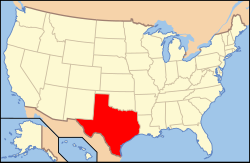LGBTQ rights in Texas | |
|---|---|
 | |
| Legal status | |
| Discrimination protections | Federally protected for employment only; no other statewide anti-discrimination laws |
| Family rights | |
| Recognition of relationships | Same-sex marriage since 2015 [1] |
| Adoption | Adoption permitted for married couples |
Lesbian, gay, bisexual, and transgender (LGBTQ) people in the U.S. state of Texas have some protections in state law but may face legal and social challenges not faced by others. Same-sex sexual activity was decriminalized in Texas in 2003 by the Lawrence v. Texas ruling. On June 26, 2015, the Supreme Court of the United States ruled bans on same-sex marriage to be unconstitutional in Obergefell v. Hodges . A majority of Texans support same-sex marriage and anti-discrimination laws for LGBTQ people. [2]
Contents
- Laws regarding same-sex sexual activity
- Sodomy ban
- Romeo and Juliet law
- Recognition of same-sex relationships
- Marriage
- Domestic partner benefits
- Family and relationship policy
- Politics
- Legislative and regulatory proposals
- Efforts to restrict gender-affirming healthcare for minors
- Social workers and discrimination
- Stance on LGBT support organizations
- Transgender people in the performing arts
- Education
- Discrimination protections
- Texas courts
- State law
- Counties with LGBT protections
- Cities with LGBT protections
- School districts with LGBT inclusive policies
- University LGBT non-discrimination policies
- Discrimination in Texas
- Gender identity and expression
- Documentation
- Attempts to compile lists of those who changed gender
- Bathroom restrictions
- Gender-affirming healthcare
- Marriage and gender identity
- Sports
- Other legal and policy issues
- Hate crime law
- Sex education
- City bounty
- Public opinion
- Support organizations
- Transgender Education Network of Texas
- Summary table
- See also
- Notes
- References
- Further reading
- External links
Texas has a hate crime statute that strengthens penalties for certain crimes motivated by a victim's sexual orientation, although crimes are rarely prosecuted under the statute. The law does not cover gender identity. [3] While some localities in Texas have ordinances that provide a variety of legal protections and benefits to LGBTQ people, Texas has had no statewide law banning anti-LGBT discrimination. The federal protections against employment discrimination based on sexual orientation or gender identity, established in 2020 by several landmark cases, apply in Texas. Several metropolitan cities in Texas, including Austin, Dallas, and San Antonio, provide resources, supportive communities, and local anti-discrimination protections for their LGBTQ people. [4] [5] Since September 1, 2025, Texas has explicitly listed banned DEI school and even certain workplace programs for sexual orientation—the implemented law is being challenged by the courts. [6] In November 2025, Texas voters passed a legislative amendment codifying "parental rights" within the state's constitution. [7]



